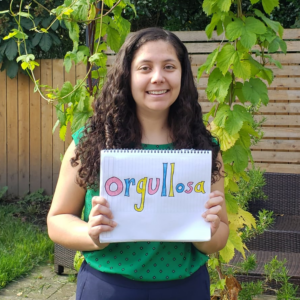When I wrote about the reasons why I choose to use the word Latinx, for myself and for A Way Home Washington’s organizational voice, I touched on the fact that within the community there are vast differences of opinion on the word. You’ll likely find just as many cases for embracing the word as you’ll find rejections of the word floating out there. For me, one of the strongest reasons to embrace Latinx is to recognize the intersections in our identities.
Last year, I read an interview with Pose actress Mj Rodriguez where she spoke about how as Latinx people we must evolve in our understanding and treatment of the LGBTQ+ community. Watching the season 1 Pose episode where Blanca sees her family for the first time in years made me deeply sad because I felt the scene could have taken place in the 80s (when the show is set) or in 2020. In the rejection of the word Latinx, I see a resistance to recognize and embrace queerness in our community.
As with all issues that disproportionately impact a certain community, we must dig deep into the root causes if we want to solve it. Just like people of color aren’t born predisposed to homelessness, Latinx people aren’t born predisposed to transphobia and homophobia. But we are raised in environments filled with the scars of colonialism and white supremacy, and we internalize narratives that oppress the LGBTQ+ community.
While Latin America is a region filled with people of Indigenous, African, and European roots, many cultural markers that we associate with latinidad today are the vestiges of European colonization. When the Spanish came to our shores, they were dually interested in the continent’s natural riches and in spreading Catholicism. To this day, some Latin American people and Latinx people in the United States point to their religion as the reason they discriminate against the LGBTQ+ community. Even within the past few years, I have seen protests rise in my home country, Panama, opposing the notion that schools should teach children that trans and non-binary folx are part of our community, worthy of respect.

As a pansexual Latina and an advocate to end young and young adult homelessness, untangling the web of beliefs that leads to discrimination within my community matters to me. First, because LGBTQ+ people are part of our Latinx community, and we deserve for our identities to be acknowledged and respected. And second, because when we say that LGBTQ+ young people and young people of color disproportionately experience homelessness, we must recognize that these two identities do not exist separately. Many young people are LGBTQ+ AND people of color, and I want to be part of a culture that cares for them and gives them homes where they can feel safe and loved.
“Con un dedo no se tapa el sol.” You can’t cover the sun with a finger. That’s what my father told me yesterday when I spoke to my parents about my desire to raise Latinx children who grow up knowing that LGBTQ+ folx are part of our community, worthy of respect. I chose to interpret that as a tiny concession in our generational divide, an acknowledgement that hiding the truth from children won’t get us to a better world. After that conversation, I thought about all the other Latinx children who’ve grown up to see that discrimination – whether it’s transphobia, homophobia, anti-Blackness among non-Black Latinx folx – has no place in our culture. That it was not a part of our culture to begin with, but has taken root after centuries of colonialism. We’re out here, talking to our elders, committing even before our children are born that they will feel safe and loved by us as they are. And I am hopeful that together we will be enough to create the culture our future needs.

Leave a Reply